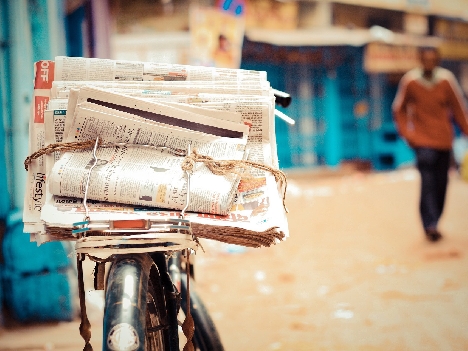The Institute for South Asia Studies invites you to a panel discussion titled Evolving News Media Landscapes in India and Pakistan: Implications for regional peace and stability , based on a recent report by Fatima Salman of the Atlantic Council that sheds light on the critical implications that reconfiguring the media ecosystem has on India and Pakistans domestic politics and foreign policy, and the geopolitics of South Asia.
_________________
DATE: Thursday, September 24, 2020
TIME: 9am Berkeley | 12 noon Washington DC | 5pm London | 9pm Lahore | 9:30pm New Delhi | Calculate Your Local Time
This event will also be live streamed on the Institute's FB page: ISASatUCBerkeley
_________________
Executive Summary:
India and Pakistan recognize the utility of the press in contemporary conflicts, and seek to deploy it as an offensive weapon in a larger information war. Both countries have utilized digital, print, and broadcast media to shape international perceptions and public opinion domestically. With every new border skirmish, New Delhi and Islamabad ramp up a nationalist narrative, with news media outlets and journalists riling up jingoistic fervor with every newscast. Understanding India and Pakistans laws and policies regarding mass media explains todays government-media nexus.
Between 2018 and 2020, the region witnessed a surge in violations of press freedom. High levels of threats, intimidation, and attacks on journalists and their media outlets have led to both India and Pakistan languishing at the bottom of the 2020 Press Freedom Index.1 This report is a culmination of a two-year effort to convene journalists from both India and Pakistan for cross-border exchanges and dialogue. Field interviews with journalists based in New Delhi, Mumbai, Islamabad, Karachi, and Lahore have helped generate the bulk of the findings we report here, including our analysis of their implications and our proposals for a path forward for news media in the region.
Our conversations centered on the news medias role in diplomacy, examining the opportunities and challenges media narratives offer in shaping the national narratives. Journalists and civil-society actors emphasize the dangers of the current anti-press climate in both India and Pakistan, underscoring that heavy censorship and corporate buyouts have led to flawed media reports and the proliferation of incendiary misinformation. Historically, news media have played a major role in nation-building, foreign policy, and shaping the public narrative, often reflecting a frail freedom antagonized by laws that privilege narrow conceptions of national security and defense above all else. Curbs on these freedoms date back to the time of liberalization, as both India and Pakistan institutionalized a free, pluralistic press only to double down immediately on efforts to stifle its independence and integrity. This widening and tightening of rules and regulations, and the financial strangulation of local news outfits, has reconfigured the news media space, which is now characterized by pervasive distrust and deepening fragmentation in both countries.
This report, made possible by generous support from the Ploughshares Fund, sheds light on the critical implications that reconfiguring the media ecosystem has on India and Pakistans domestic politics and foreign policy, and the geopolitics of South Asia. A critical way forward is to rethink cross-border reporting with the aim to improve and uphold rigorous regional news coverage. However, a free and diverse news media can only be truly independent if the news media in both countries invest in reinventing their business models. Finally, political elements in both countries have worked to dehumanize the other side through planted narratives and agendas. Networks must invest in reversing this dangerous trend, and in rehumanizing the other side, in order to build more nuance and substance into the social fabric of their coverage of one another.
Panelist Bios:
Irfan Nooruddin, an expert in economic development, democratization, and civil conflict in the developing world, is the director of the India Initiative and the Hamad bin Khalifa Al-Thani Professor of Indian Politics in the Asian Studies Program in the School of Foreign Service, Georgetown University. He also serves as the Director of the South Asia Center at the Atlantic Council. More on Prof. Nooruddin HERE.
Kamal Siddiqui is an Australian journalist of Pakistani origin. He is currently the Director of Center for Excellence in Journalism at Institute of Business Administration in Karachi. Previously, he was the editor of the Express Tribune, the Pakistani affiliate of the International Herald Tribune. Before that, he was the Editor Reporting at The News based in Karachi. He has written for The Age and The Australian. More on Mr. Siddiqui HERE.
Nidhi Razdan is an Indian journalist, television personality and an associate professor of journalism at Harvard University, United States since June 2020. She was the executive editor of NDTV and the primary anchor of NDTV 24x7 news show Left, Right & Centre. More on Ms. Razdan HERE.

